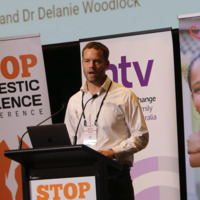Papers by Bianca Fileborn

The practices comprising the analytic category of street harassment are rarely responded to throu... more The practices comprising the analytic category of street harassment are rarely responded to through either criminal or restorative justice approaches, and the possibilities for transformative justice have to date not been considered. In this article we advocate for a victim-centred justice response to street harassment, specifically examining the potential for transformative justice to function in this way. Drawing on data from a recent Australian study, we examine participants' understandings of justice and desired justice responses to street harassment. Par-ticipants' responses drew attention to a range of perceived shortcomings of the formal justice system as a mechanism for responding to street harassment. Instead, participants advocated for a justice response concerned with transforming cultural and structural norms, in particular gender norms. We end in an examination of the limitations of transformative justice, looking to recent work on ''kaleidoscopic justice'' as a way of transforming common conceptions of justice itself.

Feminist Legal Studies
The practices comprising the analytic category of street harassment are rarely responded to throu... more The practices comprising the analytic category of street harassment are rarely responded to through either criminal or restorative justice approaches, and the possibilities for transformative justice have to date not been considered. In this article we advocate for a victim-centred justice response to street harassment, specifically examining the potential for transformative justice to function in this way. Drawing on data from a recent Australian study, we examine participants' understandings of justice and desired justice responses to street harassment. Par-ticipants' responses drew attention to a range of perceived shortcomings of the formal justice system as a mechanism for responding to street harassment. Instead, participants advocated for a justice response concerned with transforming cultural and structural norms, in particular gender norms. We end in an examination of the limitations of transformative justice, looking to recent work on ''kaleidoscopic justice'' as a way of transforming common conceptions of justice itself.
Archives of Sexual Behavior
https://www.book2look.com/embed/9781317093558

This article provides a critical review of current literature on the sexual assault of older wome... more This article provides a critical review of current literature on the sexual assault of older women—including an exploration of the
specific features and emotional and physical impacts of older women’s experiences—and highlights current gaps and future
directions for research, practice, and theory. A review of the literature indicates that older women constitute only a small
proportion of victim/survivors. However, there is evidence to suggest that existing research underestimates the extent of this
issue. Older women face particular barriers to disclosure and accessing the justice system, resulting in their experiences remaining hidden. Many of these barriers also contribute toward older women’s experiences being ignored, dismissed, or downplayed by potential bystanders. These barriers are explored in depth in this article and include cultural context, ageism, cognitive and health impairments, and living in a residential care setting. Responding to, and preventing, the sexual assault of older women requires a tailored approach—and we currently lack sufficient insight to develop appropriate responses. In closing, this article considers how we might work toward achieving ‘‘justice’’ for older women victim/survivors.

Sexual and Relationship Therapy, 2014
Despite the body being central to the experience of ageing, little attention has been paid to how... more Despite the body being central to the experience of ageing, little attention has been paid to how relationships may mediate the experience of ageing bodies. This article considers older Australian women's accounts of their bodies and of embodied experiences in the context of both long-term and newly formed intimate relationships. Drawn from a broader study of ageing and sexuality, our analyses of semi-structured interviews with 20 women aged 55 to 72 revealed that while women were frequently unhappy with their appearance, this was less important to them in relationships. During sexual intimacy, embodied experience and the capacity for bodies to be sites of pleasure were emphasised. Overall, participants experienced their bodies as sites of negotiation between socially constructed meanings of older bodies and subjectively produced ones, in complex and sometimes contradictory ways that fell outside simple distinctions between social and individual.
This paper explores young adults’ suggestions for preventing unwanted sexual attention in license... more This paper explores young adults’ suggestions for preventing unwanted sexual attention in licensed venues. Despite emerging evidence that unwanted sexual attention and sexual violence are significant issues faced by young adults in the night-time economy, there has been little introduced in the way of preventative strategies or campaigns. Drawing on a mixed methods research project undertaken in Melbourne, Australia, I contend that exploring young adults’ suggestions for prevention is instructive in a number of ways. Young adults
are the primary users of licensed venues and thus may provide insight into potential strategies for prevention. It can also illuminate the discursive positions that young adults draw on in
talking about prevention and their understandings of unwanted sexual attention.

Sexual violence within the lesbian, gay, bisexual, transgender/transsexual, intersex and queer (L... more Sexual violence within the lesbian, gay, bisexual, transgender/transsexual, intersex and queer (LGBTIQ) communities remains largely under-researched and undertheorised. Yet, emerging research suggests that sexual violence is a significant issue within the LGBTIQ communities. Additionally, the occurrence of sexual violence and unwanted sexual attention within specific social and cultural contexts is, for the most part, insufficiently examined. This article draws on research exploring young LGBTIQ adults' perceptions and experiences of unwanted sexual attention in licensed venues. Firstly, I consider the theoretical and conceptual underpinnings of 'unwanted sexual attention' as a category of analysis. I then move on to consider participants' use of licensed venues, the particular significance of pubs and clubs to LGBTIQ young people, and their perceptions and experiences of unwanted sexual attention. Finally, I discuss the implications of these findings for theoretical and conceptual understandings of unwanted sexual attention and sexual violence.
This article explores the ways in which young adults produce a sense of safety in pubs and clubs.... more This article explores the ways in which young adults produce a sense of safety in pubs and clubs. Despite considerable anxiety around issues pertaining to safety and violence in the night-time economy, there is little consideration of how young adults themselves feel about their safety on a night out, or how
they achieve a sense of safety in a seemingly ‘risky’ social space. Drawing on mixed-methods research conducted in Melbourne, Australia, in this article I consider the strategies that young adults used to feel safe on a night out. I argue that feeling ‘safe’ is something that is actively produced through the
use of these strategies, as well as providing an avenue for ‘doing’ gender.
In this article I reflect on my experiences of using Facebook as a recruitment tool. Although the... more In this article I reflect on my experiences of using Facebook as a recruitment tool. Although there were many benefits associated with using this method of recruitment, there were also several unanticipated ethical dilemmas that arose. This article reflects on these dilemmas, locating them within some broader concerns around online research and privacy, and
considers some potential avenues for avoiding similar issues in future research. It became apparent that these ethical issues were heightened for me as a doctoral researcher in a process of identity transition. I consider how this state of ‘shifting’ identity heightened my experience of these ethical tensions, and brought to the fore questions around online identity
management and ways of ‘doing’ identity online.

Journal of Aging Studies
This study explored the sexual subjectivities of older Australian women. In this article we prese... more This study explored the sexual subjectivities of older Australian women. In this article we present findings from 15 qualitative interviews with Australian women aged 55-81 who were single at the time of interview. The majority of these women were single following divorce or separation, with a smaller number of women who were widowed or never in a long-term relationship. We found that these women's sexual desire and sexual activity were fluid and diverse across their life course. Although some participants desired a romantic or sexual relationship, they were also protective of their independence and reluctant to re-enter into a relationship in later life. Our findings indicate that these women's sexual subjectivities were shaped by dominant norms of ageing, sex, and gender. At the same time, older women are challenging and resisting these norms, and beginning to renegotiate sexuality in later life.

Sex and Relationship Therapy
Older age is often associated with asexuality. That is, older individuals are not viewed as desir... more Older age is often associated with asexuality. That is, older individuals are not viewed as desiring of sex, nor as sexually desirable to others. Broader social and cultural norms that downplay women's sexual desire and agency further compound these phenomena. Whether this popular image accurately reflects older women's sexual desires, behaviour and capacity to experience pleasure is unclear. Drawing on semi-structured interviews with 43 partnered Australian women aged 55À81, this article considers women's sexual experiences and desires in older age. The findings of our research confirm that older women's experiences of sex and sexual desire are diverse and fluid. Some of the factors that influenced participants' sexual behaviour and desire will be considered in this article, as will their understandings of what "counts" as sexual satisfaction and "successful sex". The factors affecting sexual behaviour and desire also influence the way in which women are able to negotiate sexual interaction with their partners. Participants expressed a need for education and resources in order to gain greater control and to make autonomous choices over their sexual experiences, desire and ability to give and receive pleasure. The implications of these findings for practitioners are also considered.

Griffith Journal of Law & Human Dignity, 2(1), May 2014
Street harassment is a common, pervasive experience in the lives of many women. Despite both anec... more Street harassment is a common, pervasive experience in the lives of many women. Despite both anecdotal and research evidence confirming its prevalence, and the harm caused by street harassment, it is rarely responded to by the criminal justice system -particularly in its more "minor" incarnations. Online activist sites such as Hollaback have emerged in recent years in response to this legal silence regarding street harassment. While the aim of these sites is to draw attention to women's experiences and work towards achieving legal responses to street harassment, this article considers the extent to which online activist sites could function as an informal justice mechanism for victims of street harassment. Drawing on the literature on sexual assault victim/survivors' justice needs, this article firstly approximates what street harassment victims' justice needs may be. It then moves on to consider the ways in which the online activist site Hollaback Melbourne may function as an avenue for street harassment victims' needs to be met. Ultimately, while it is clear there is much potential for online activist sites to act as an informal justice mechanism, further work is required to identify street harassment victims' actual justice needs.










Uploads
Papers by Bianca Fileborn
specific features and emotional and physical impacts of older women’s experiences—and highlights current gaps and future
directions for research, practice, and theory. A review of the literature indicates that older women constitute only a small
proportion of victim/survivors. However, there is evidence to suggest that existing research underestimates the extent of this
issue. Older women face particular barriers to disclosure and accessing the justice system, resulting in their experiences remaining hidden. Many of these barriers also contribute toward older women’s experiences being ignored, dismissed, or downplayed by potential bystanders. These barriers are explored in depth in this article and include cultural context, ageism, cognitive and health impairments, and living in a residential care setting. Responding to, and preventing, the sexual assault of older women requires a tailored approach—and we currently lack sufficient insight to develop appropriate responses. In closing, this article considers how we might work toward achieving ‘‘justice’’ for older women victim/survivors.
are the primary users of licensed venues and thus may provide insight into potential strategies for prevention. It can also illuminate the discursive positions that young adults draw on in
talking about prevention and their understandings of unwanted sexual attention.
they achieve a sense of safety in a seemingly ‘risky’ social space. Drawing on mixed-methods research conducted in Melbourne, Australia, in this article I consider the strategies that young adults used to feel safe on a night out. I argue that feeling ‘safe’ is something that is actively produced through the
use of these strategies, as well as providing an avenue for ‘doing’ gender.
considers some potential avenues for avoiding similar issues in future research. It became apparent that these ethical issues were heightened for me as a doctoral researcher in a process of identity transition. I consider how this state of ‘shifting’ identity heightened my experience of these ethical tensions, and brought to the fore questions around online identity
management and ways of ‘doing’ identity online.
specific features and emotional and physical impacts of older women’s experiences—and highlights current gaps and future
directions for research, practice, and theory. A review of the literature indicates that older women constitute only a small
proportion of victim/survivors. However, there is evidence to suggest that existing research underestimates the extent of this
issue. Older women face particular barriers to disclosure and accessing the justice system, resulting in their experiences remaining hidden. Many of these barriers also contribute toward older women’s experiences being ignored, dismissed, or downplayed by potential bystanders. These barriers are explored in depth in this article and include cultural context, ageism, cognitive and health impairments, and living in a residential care setting. Responding to, and preventing, the sexual assault of older women requires a tailored approach—and we currently lack sufficient insight to develop appropriate responses. In closing, this article considers how we might work toward achieving ‘‘justice’’ for older women victim/survivors.
are the primary users of licensed venues and thus may provide insight into potential strategies for prevention. It can also illuminate the discursive positions that young adults draw on in
talking about prevention and their understandings of unwanted sexual attention.
they achieve a sense of safety in a seemingly ‘risky’ social space. Drawing on mixed-methods research conducted in Melbourne, Australia, in this article I consider the strategies that young adults used to feel safe on a night out. I argue that feeling ‘safe’ is something that is actively produced through the
use of these strategies, as well as providing an avenue for ‘doing’ gender.
considers some potential avenues for avoiding similar issues in future research. It became apparent that these ethical issues were heightened for me as a doctoral researcher in a process of identity transition. I consider how this state of ‘shifting’ identity heightened my experience of these ethical tensions, and brought to the fore questions around online identity
management and ways of ‘doing’ identity online.
Dealing with issues such as the roles gender, sexuality, space, and social belonging play in shaping young adults' experiences, this book recounts how young people make sense of unwanted sexual attention within a culturally complex, alcohol-fuelled, and sexually-charged environment. A thorough and thought-provoking text, this book will be of particular interest to scholars of criminology, sociology, and political science.